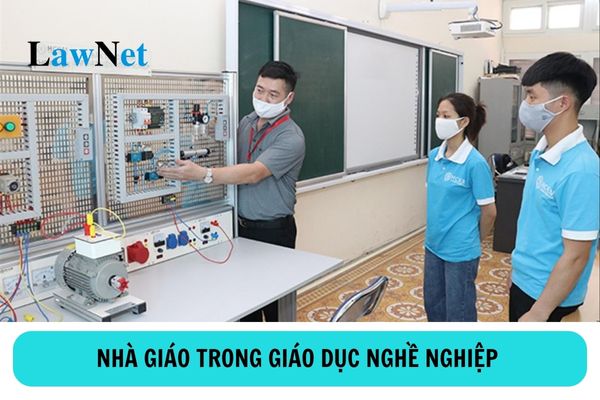Vietnam: What are the regulations on qualifications of educators in vocational education?
What are the regulations on qualifications of educators in vocational education?
Pursuant to Article 54 of the 2014 Vocational Education Law of Vietnam, tqualifications of educators in vocational education are as follows:
- An educator at elementary-level must obtain at least a degree of vocational secondary schools or a certificate in vocational skills used for teaching elementary-level.
- An educator teaching theory at intermediate-level must obtain at least a bachelor’s degree; an educator teaching practice at intermediate-level must obtain a certificate in vocational skills used for teaching practice at intermediate-level.
- An educator teaching theory at college-level must obtain at least a bachelor’s degree; an educator teaching practice at college-level must obtain a certificate in vocational skills used for teaching practice at college-level.
- An educator teaching both theory and practice at intermediate-level or college-level must achieve acquire qualifications equivalent to qualifications of the educator teaching theory and educator teaching practice as prescribed in Clause 2 and Clause 3 Article 54 of the 2014 Vocational Education Law.
- Any educator obtaining no college degree in pedagogy, college degree in technical pedagogy or bachelor’s degree in pedagogy, or bachelor’s degree in technical pedagogy is required to obtain a certificate in pedagogy.
* The Head of vocational education authority in central government shall regulate the content of training programs, improve vocational skills and certificate in vocational skills used for teaching practice at all levels; content of pedagogical proficiency course provided for educators in the vocational education institution.

What are the regulations on qualifications of educators in vocational education? (Image from the Internet)
Can an educator in a vocational education institution be referred to as a lecturer?
Pursuant to Article 53 of the 2014 Vocational Education Law:
Educators in vocational education institutions
1. Educators in vocational education institutions include educators teaching theory, educators teaching practice, or educators teaching both theory and practice.
2. Educators in the vocational education centers or vocational training schools shall be called as educators; educators in colleges shall be called as lecturers.
3. Titles of educators in the vocational education institution include: teachers, principal teachers, senior teachers; lecturers, principal lecturers, and senior lecturers.
4. An educator in vocational education institutions must meet requirements below:
a) Has virtuous characters;
b) Achieves the qualifications in professional competence and proficiency;
c) Has good health as required by his/her job;
d) Has a clear criminal record.
Thus, educators in vocational education institutions are called lecturers if they teach at colleges.
Educators teaching at vocational training centers or intermediate schools are not referred to as lecturers but as teachers.
What are the tasks and entitlement of educators in vocational education institutions?
Pursuant to Article 55 of the 2014 Vocational Education Law, the tasks and entitlement of educators in vocational education institutions are as follows:
- Teach according to objectives and training programs and ensure to carry out the sufficient and quality training programs.
- Learn and improve their professional competence, proficiency and teaching methods.
- Exemplarily fulfill civil obligations, law and regulations of organization and operation of vocational education institution.
- Reserve the virtue, prestigious, or honor of educators; respect personality of learners, fairly treat learners, protect legitimate rights and interests of learners.
- Manage and observe the vocational education institution; participate in the Communist Party, unions and other social work.
- Use teaching materials, equipment or aids, equipment and facilities of the vocational education institution.
- Conclude a visiting lecturer contract with other vocational education institution as prescribed.
- Give opinion about policies or plans of the vocational education institution on programs, materials, methods of teaching and other issues related to their rights.
- The educator must reserve time to take a probation at the enterprise to update and improve practice skills and access new technology as prescribed.
- Other tasks and entitlement as prescribed in regulations of law.
What policies does the State have for educators in vocational education institutions?
Pursuant to Article 58 of the 2014 Vocational Education Law, the State's policies for instructors in vocational education institutions are as follows:
- Educators in public vocational education institutions shall benefit from the following policies:
+ Receive salaries according to their titles prescribed in Clause 3 Article 53 of the Law on Vocational Education 2014; receive incentive allowances according to their disciplines, receive seniority pay regarding educators, particular allowances regarding educators teaching both theory and practice, craftsmen, skilled educators teaching practice, educators teaching disciplines which are heavy and dangerous, and educators teaching the disabled as prescribed in regulations of the Government;
+ Incentive policies applied to educators teaching in special schools, schools in severely disadvantaged areas and other incentive policies applied to educators as prescribed in regulations of the Government.
- Attend refresher courses in professional competence or proficiency as prescribed in regulations of the Government.
- The State shall encourage educators to teach in vocational education institutions in severely disadvantaged areas; enable educators to teach in the vocational education institutions in disadvantaged or severely disadvantaged areas.
- If any educator, administrative official, or scientific research official of vocational education satisfies requirements prescribed in regulations of law, he/she shall be conferred a title of People's Educator or Educator of Merit.
- If the educators who are doctors, craftsmen or skilled people teaching in public vocational education institutions and having good health voluntarily extend their working time at the vocational education institution with the consent of the vocational education institutions, they may take later retirement as prescribed in law on labor.
- The State adopts policies on investment in training and refresher courses in professional competence, skills, and pedagogical methods applied to educators teaching the disabled.

